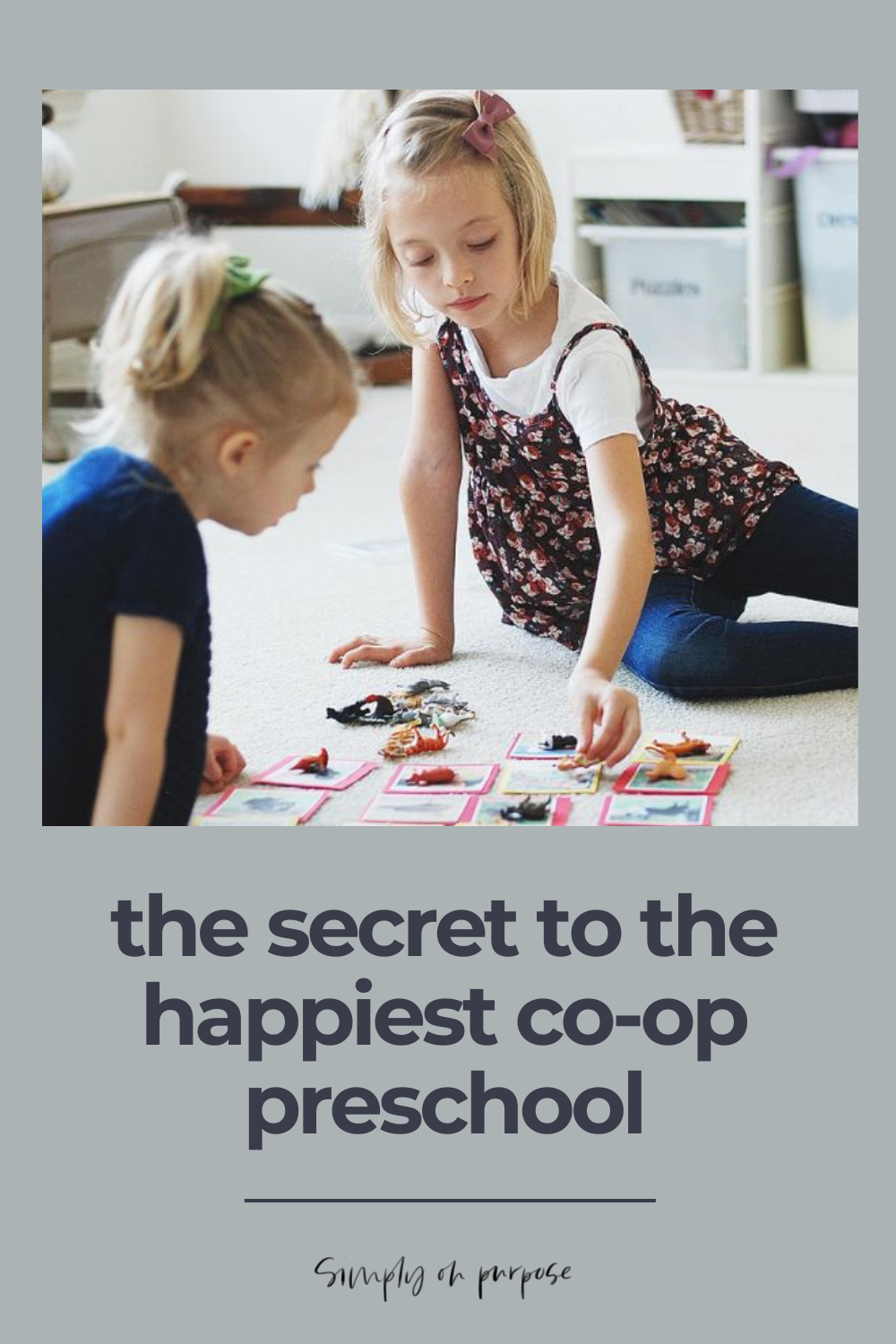A co-op preschool is a low-cost way to be involved with your child’s education while fostering a love of learning and lasting friendships.

It’s that time of year friends!
Parents everywhere are searching and deciding what to do with their preschoolers come September. More and more are turning to preschool co-ops.
How to Start a Co-op Preschool
The first step to starting your own parent-run co-op preschool is to find 2-5 like-minded families to join you! (I recommend asking around and finding people through your church congregation, community Facebook page, neighborhood, friends of friends, or even a flyer at the library.)
Then choose as a group how often you’d like to have it and for how long. The beauty of a parent-run co-op is that YOU, who knows your child and your season of life best, get to decide.
Depending on the ages of the children, I would recommend 1 day a week for 3-year-olds, and 2 days a week for 4-5 year-olds.
The Secret that Makes it Enjoyable for Everyone
Once you have your small group of parents (I recommend 2-5 families) with similarly aged children, you all pick a subject that you LOVE TO TEACH and naturally interested in.
For example, if they love math, they choose to teach math. They would do activities that teach shapes, have the kids practice counting and identifying numbers, and they’d pick books that reinforce those concepts. Plus cooking and measuring!
It not only becomes self-motivating when the teacher loves the subject but it also spontaneously increases the quality of content being taught! Children are able to sense the passion the teacher has for the subject and they will feed off that interest.
Children at this age want lots of different things to soak up! Bugs, baking muffins, dancing with scarves, counting beans, writing letters with salt, etc- all are fun to explore for young children.
A Sample Co-op Preschool Rotation
Below is an example of 4 subjects (for each week of the month) that can be included in your rotation. Each parent is assigned a week and teaches her/his chosen subject for that week.
- Science
- Math and Cooking
- Music and Movement
- Literacy
Remember, the subjects come from the passions of the parents so other subjects might include art, STEM, nature, etc.
A Sample Schedule of Co-op Preschool
When thinking about your schedule, remember that attention spans are quite small in small children, often just one minute per year of age ( meaning 3-year-olds have about 3 minutes!). Plan on moving between areas fairly often.
Here’s a basic outline for a preschool co-op:
9:00-9:20 Self-selected activities (such as puzzles)
9:20-9:30 Hellos and getting ready for the day
9:30-10:00 Instruction (most likely broken up into two different sections and/or areas of the house in order to keep children interested)
10:00-10:30 Snack and outside play
10:30-10:50 Instruction/ Story Time (a great time for using books to reinforce a concept)
10:50-11:20 Cooperative play
11:20-11:30 Clean up
11:30-11:50 Lunch and clean up
11:50-12:00 Books and Goodbyes
Pros and Cons of Co-op Preschool
Confession: I have a degree in early childhood education and LOVE having extra children in my home.
A co-op preschool has many benefits, but it might not be for everyone! Some parents might dread it and find it completely outside their comfort zone- that’s completely acceptable!
Here are some pros and cons of co-op preschool to help you decide if this might be a good fit for you.
Pros
- low-cost: each parent pays for their own snacks and supplies for the lessons they teach- no tuition!
- lasting friendships for both kids and parents: a small group size means more genuine interaction and space for relationships.
- child independence: on the weeks you don’t teach, your child learns independence by going to the
- parent’s role in education: you decide what subjects are taught and hand-pick the homes your child will go to where they will feel safe and loved.
Cons
- responsibility of hosting: on your rotation, you have extra kids in your home for 3 hours
I hope all of this information gives you the confidence to make a choice in your child’s preschool experience. If you have any questions or ideas that might be helpful to others, please leave them in the comments!
If you want to learn more about your influence as a parent, check out these other resources:



Love these suggestions! As a mom who did a preschool co-op for many years, I’d also add this advice for parents who are overwhelmed with coming up with their own lesson ideas/plans: buying a curriculum can be a great way to get all the parents on the same page and still save loads of money over traditional preschool. Personally, I love Mother Goose Time, as it comes with lesson plans, supplies, and music and takes almost no prep time for the parent-teacher, but there are many options available.